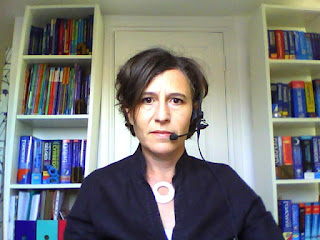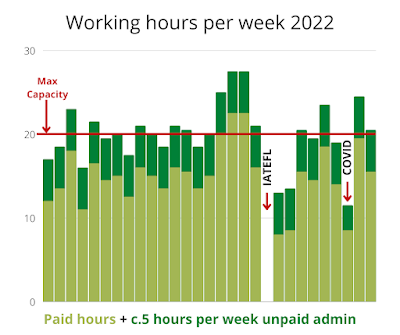Disability Pride month: writing with one arm behind your back
July is disability pride month and at the start of the month, I attended a webinar by the Authors with Disabilities and Chronic Illnesses (ADCI) group of the Society of Authors. At the time, I was laid low with Covid, but it provided lots of food for thought and I’ve been mulling it over since.
My situation
I don’t think of myself as having a disability, but I have been living – and working – with chronic pain for more than 20 years. It’s something I’ve written about previously and how it affects my ability to work. A few years ago, it was really debilitating with constant pain throughout my upper body that left me struggling with even the basics of life. As is common with chronic pain sufferers, the pain volume control on my nervous system had got turned right up to the max.
Thankfully, over the past few years, I’ve got my condition much more under control and have dialled things back to just the site of my original injury – a dislocated right collarbone. I now spend a lot of my time pain-free and the pains I do experience are localized and often no more than passing tweaks and twinges. However, whilst things are hugely better than they were, I’ve discovered that I still need to operate within certain limits. Last year, I started on a new project that involved quite focused, detailed sort of work. It didn’t take long for my pains to flare up again quite badly and I realized I couldn’t overdo things. After a few weeks, I reduced the number of hours I was working and things settled down again. Since then, I’ve been working 15 hours a week on my main project, with a handful of extra hours on admin and other small projects, up to a maximum of 20 hours a week. And that seems to be a comfortable, sustainable level.
It's great to have found a balance that works, but I’m aware that as a freelancer, it’s not always easy to guarantee a regular workflow at the same level and, beyond my current project, I’ll be back to trying to take on enough work without overloading myself physically. And of course, part-time hours also means a part-time income. I probably earn around 60% of what I could if I was able to work full time, which brings me down to well below the average income in the UK – although not low enough to be eligible for any kind of support.
Inclusion and access
Getting back to the webinar, one of the key topics of discussion was inclusion of those with disabilities and chronic illnesses within the publishing industry in general and more specifically what can be done to improve accessibility for writers. One speaker talked about the use of accessibility riders – a document that sets out someone’s accessibility needs at the start of a contract. It’s a really interesting idea and one that’s backed up legally in the UK by the 2010 Equality Act. Of course, it’s relatively easy to imagine the kind of adaptations an employer might make for an employee who, for example, was a wheelchair user and needed ramps or an adapted desk setup. What’s less straightforward is the kind of adjustments needed for people with invisible disabilities and chronic conditions. And of course, once you get into the freelance realm, the responsibilities of those you work for become much more of a grey area.
In my own case, the practical adaptations needed are not obvious. For several years when I was first diagnosed, I tried using voice recognition software to avoid too much keyboard use. It was something that publishers didn’t have a problem with and even supported; in part because I had my own software, so it didn’t require any input from them! I remember one publisher even inviting me into the office to give a demo and taking a real interest in how it worked. However, I gradually realized that keyboard use isn’t actually an issue for me, it’s navigating and formatting with a mouse that causes me pain. You can navigate using voice software but it’s really tricky and frustrating, so I eventually gave up. I’ve tried a whole variety of different devices and settled on a combination of a graphics tablet which I use with my left hand and a regular mouse which is just better for certain tasks and which I use (sparingly) with my right. That means that I try to avoid tasks with lots of fiddly formatting, including lots of work on digital materials which tend to have annoyingly mouse-heavy templates or authoring software.

Back in the days of working in a headset with increasingly frustrated cries of "scratch that" and "undo that" coming from my office!
Perhaps more significant for me though is the amount of work I can manage. As I said above, 15-20 hours a week seems to be sustainable and those hours need to be evenly spaced, not bunched up into short intensive bursts. Does that mean that I just have to put up with a lower income? Would it be reasonable to ask to be paid for hours I’m not able to work in the name of equity? Perhaps where there should be more flexibility is with workload. Ruling someone out of a project because they’re not able to work a lot of hours in a short period is surely discrimination. It’s sometimes possible to negotiate taking on a smaller chunk of a writing project, but not always. And of course, taking on a smaller chunk of work means accepting a smaller fee and the inevitable gaps between lots of short projects which is harder to manage, means more admin and is financially loss-making. Spreading a piece of work over a longer timescale would be a better solution all round but would require changes in scheduling and longer deadlines. That should be perfectly possible in publishing, but often doesn’t happen because of poor planning and squeezed schedules. It’s a source of frustration for most freelancers, for me it’s either a source of pain, or more likely, rules me out of work.
Awareness
Should I be more transparent about my condition? Should I
have an accessibility rider setting out what I can manage and what adjustments
I might need? I certainly don’t keep my health a secret and many editors who
I’ve worked with over the years know about my situation; although they don’t
always fully understand the implications. I know of well-meaning editors who
haven’t offered me work on projects because they thought it would be hard on me
physically, when actually it would’ve been fine. Especially with the ups and
downs of a chronic condition, they may have dealt with me at a time when I was
really struggling and had to cut back or pull out of something and assume that
the same applies going forward. That’s especially problematic given the big
improvements I’ve seen in recent years. And of course, I don't know how many editors have just chosen not to offer me future work because they thought my health limitations would just be too much trouble ...
And I don’t always mention my health and its limitations. In part, that’s a conscious decision. The changes I’ve made to control my condition recently have largely been about mindset and a mind-body approach to pain control. In short, I’ve shifted my mental focus away from the pain and stopped letting it define my life. So, I don’t want to have to keep making an issue of it in a work context. If I don’t anticipate something being problematic, there seems no need. So sometimes “availability” just ends up doing a lot of heavy lifting. When I say that I don’t have enough availability to take on a job, I’m sure people assume I have a packed schedule, when in reality, they’re often just asking for more hours than I can comfortably commit to, even with a completely empty schedule.
The ADCI webinar brought up many other issues, some relevant to my own situation, some less so. There’s the issue of variability for those with chronic conditions, managing work through good days and bad days, good patches and bad patches, good energy levels and dips - and how that affects schedules and deadlines. There’s the concept known within the community as ‘spoons’, something I could really relate to when my condition was at its worst, which you can read about here if you’re interested. And then there’s representation of people with disabilities and chronic conditions in what we write, including in ELT materials. But that’s a topic for another day, I think.
Labels: ADCI, chronic pain, disability, RSI, Society of Authors, workflow



1 Comments:
Thank you, Julie, for this thoughtful and insightful post. I'm sure that many people don't understand what it must be like to try and work as a freelancer with an invisible but chronic condition. I had a period in my life, as an employee, with what was then called 'RSI'. It was really depressing and what's worse, because there were no outwardly visible signs, people didn't really understand or believe you were suffering and in a lot of pain. But at least I was lucky enough to be paid during this period.
Post a Comment
<< Home